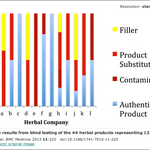Though measles outbreaks remain somewhat under control, they aren't going down. Deaths have held steady at around 150,000 per year since 2007.
The developing world can get something of a pass for not being able to contain measles. In anti-science hotbeds like the coasts in America and some countries in Europe, it's unforgivable. What was once only the domain of religious fundamentalists is now dominated by wealthy elites who count on the herd immunity of commoners to protect their children and refuse to vaccinate. But that clearly does not work.
A new antiviral drug, ERDRP-051, may protect…
Pharmacology

Young adults who used marijuana recreationally show significant abnormalities in two key brain regions that are important in emotion and motivation, according to a study in the Journal of Neuroscience.
The authors document how casual use of marijuana is related to major brain changes and showed the degree of brain abnormalities in these regions is directly related to the number of joints a person smoked per week. The more joints a person smoked, the more abnormal the shape, volume and density of the brain regions.
"This study raises a strong challenge to the idea that casual marijuana use…

The 15% fall in dietary salt intake, which is implicated in increased blood pressure, over the past decade in England is likely to have had a key role in the 40% drop in deaths from heart disease and stroke over the same period, according to a paper in BMJ Open.
Average salt intake across the nation is still far too high, the authors warn, and much greater effort is needed to curb the salt content of the foods we eat.
The authors base their findings on an analysis of data from more than 31,500 people taking part in the Health Survey for England for the years 2003—when initiatives to…

Sleep aids
are a more than $2 billion per year industry. Forecasts predict that global prescriptions for anti-anxiety medicines will
reach $5.9 billion per year by 2017.
But are these drugs safe?
Studies show how easy it is to get hooked and a new
study just published in the British Medical Journal shows that
anti-anxiety and sleep drugs can kill you.
Using data
from the prescription records of primary care doctors, the study compared
34,727 patients prescribed anxiolytic
(anti-anxiety) or hypnotic (sleep) drugs to 69,418 people not prescribed these
drugs. Over 90 percent of the prescribed…

It’s been all over the news.
Depending on the accuracy of the headline, you may conclude that worms live longer when exposed to glucosamine, mice live 10 percent longer when fed glucosamine or that YOU will live 8 years longer if you take the stuff.
As usual, the devil is in the headlines.
Some were pretty accurate: Glucosamine promotes longevity in worms and mice, study says (from the L.A. Times).
Some, not so much: Have Glucosamine To Increase Lifespan! (from News on Wellness)
So, to get to the bottom of this, I tried to read the entire paper. Which probably explains…

According to the FDA, a drug is a substance (other than nutrients) intended for use in the diagnosis, cure, mitigation, treatment, or prevention of disease, or to affect the structure or function of the body. Seems clear enough -- that is, until politics and big money get involved. Then you get special dispensation. It’s called the dietary supplement industry. And what they get away with is astounding.
Last May a cluster of liver failure was attributed to a supplement called OxyElite Pro, sold by USPLabs of Dallas.
Of the 29 people identified, 24 had taken this “natural” supplement.…
Antipsychotic medications are often used for in 'second-generation' form - that is, for unlabeled indications, such as treatment of children and adolescents with attention-deficit hyperactivity disorder (ADHD). Currently, atypical antipsychotic medications are FDA approved for use only in youth for schizophrenia, bipolar disorder, and irritability associated with autism. To date, no atypical antipsychotic agent has an FDA-labeled indication for use in behavioral disorders in children and adolescents.
The results of a study of atypical antipsychotic drug use among youths with ADHD,…

Anti-anxiety drugs and sleeping pills have been linked to an increased risk of death, according to a large study published in BMJ which shows that several anxiolytic (anti-anxiety) drugs or hypnotic drugs (sleeping pills) are associated with a doubling in the risk of mortality.
The findings are based on routine data but need to be interpreted cautiously.
The study accounted, where possible, for other factors such as age, smoking and alcohol use, other prescriptions and socioeconomic status. Crucially, the team controlled for contributing risk factors such as sleep disorders, anxiety…

The dose makes the poison, it is often said. And that can be the case even with beneficial products like Acetaminophen.
Acetaminophen is a commonly used pain reliever that is available in over-the-counter products (Tylenol®) and prescription medications, where it is combined with opioid analgesics (i.e., fixed-dose combination products). For example, acetaminophen in combination with the opioid hydrocodone (Vicodin® and its generic formulations) was the most prescribed medication in the U.S. each year from 2007 through 2011, according to a report by the IMS Institute of Healthcare…

Glenmark Pharmaceuticals has announced that GRC 27864 is entering human trials.
GRC 27864
targets Microsomal Prostaglandin E synthase-1 (mPGES-1) as a therapeutic target in pain management. Selective mPGES-1 inhibitors are expected to inhibit increased prostaglandin E2 (PGE2) production in the disease state without affecting other prostanoid metabolites and, consequently, may be devoid of the GI (gastrointestinal) and cardiovascular side effects seen with NSAIDs and COX-2 inhibitors, respectively.
Recent reports indicate that more than 1.5 billion people worldwide suffer from…